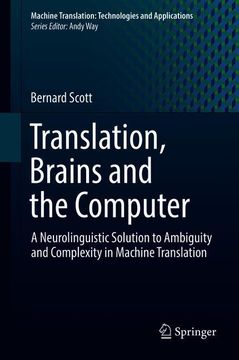Machine Translation: Technologies and Applications, 2
Share
Translation, Brains and the Computer: A Neurolinguistic Solution to Ambiguity and Complexity in Machine Translation (in English)
Bernard Scott (Author)
·
Springer
· Hardcover
Translation, Brains and the Computer: A Neurolinguistic Solution to Ambiguity and Complexity in Machine Translation (in English) - Bernard Scott
$ 151.57
$ 159.99
You save: $ 8.42
Choose the list to add your product or create one New List
✓ Product added successfully to the Wishlist.
Go to My WishlistsIt will be shipped from our warehouse between
Monday, June 17 and
Tuesday, June 18.
You will receive it anywhere in United States between 1 and 3 business days after shipment.
Synopsis "Translation, Brains and the Computer: A Neurolinguistic Solution to Ambiguity and Complexity in Machine Translation (in English)"
This book is about machine translation (MT) and the classic problems associated with this language technology. It examines the causes of these problems and, for linguistic, rule-based systems, attributes the cause to language’s ambiguity and complexity and their interplay in logic-driven processes. For non-linguistic, data-driven systems, the book attributes translation shortcomings to the very lack of linguistics. It then proposes a demonstrable way to relieve these drawbacks in the shape of a working translation model (Logos Model) that has taken its inspiration from key assumptions about psycholinguistic and neurolinguistic function. The book suggests that this brain-based mechanism is effective precisely because it bridges both linguistically driven and data-driven methodologies. It shows how simulation of this cerebral mechanism has freed this one MT model from the all-important, classic problem of complexity when coping with the ambiguities of language. Logos Model accomplishes this by a data-driven process that does not sacrifice linguistic knowledge, but that, like the brain, integrates linguistics within a data-driven process. As a consequence, the book suggests that the brain-like mechanism embedded in this model has the potential to contribute to further advances in machine translation in all its technological instantiations.
- 0% (0)
- 0% (0)
- 0% (0)
- 0% (0)
- 0% (0)
All books in our catalog are Original.
The book is written in English.
The binding of this edition is Hardcover.
✓ Producto agregado correctamente al carro, Ir a Pagar.

